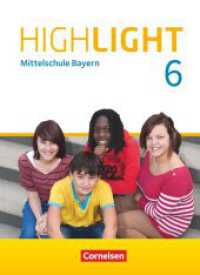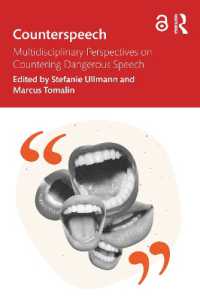- ホーム
- > 洋書
- > 英文書
- > Politics / International Relations
Full Description
Russia's annexation of Crimea in 2014 marked a watershed in post-Cold War European history and brought East-West relations to a low. At the same time, by selling this fateful action in starkly nationalist language, the Putin regime achieved record-high popularity.
This book shows how, after the large-scale 2011-2013 anti-Putin demonstrations in major Russian cities and the parallel rise in xenophobia related to the Kremlin's perceived inability to deal with the influx of Central Asian labour migrants, the annexation of Crimea generated strong 'rallying around the nation' and 'rallying around the leader' effects.
The contributors to this collection go beyond the news headlines to focus on overlooked aspects of Russian society such as intellectual racism and growing xenophobia. These developments are contextualised with an overview of Russian nationalism: state-led, grassroots and the tensions between the two.
Contents
List of figures
List of tables
Notes on contributors
Preface
Introduction: Exploring Russian nationalismsPål Kolstø and Helge Blakkisrud
Part I Official nationalism
1. Contemporary Russian nationalism in the historical struggle between 'official nationality' and 'popular sovereignty'Emil Pain
2. Imperial and ethnic nationalism: A dilemma of the Russian eliteEduard Ponarin and Michael Komin
3. Kremlin's post-2012 national policies: Encountering the merits and perils of identity-based social contractYuri Teper
4. Sovereignty and Russian national identity-making: The biopolitical dimension 129
Andrey Makarychev and Alexandra Yatsyk
Part II Radical and other societal nationalisms
5. Revolutionary nationalism in Contemporary RussiaAlexandra Kuznetsova and Sergey Sergeev
6. The Russian nationalist movement at low ebbAlexander Verkhovsky
7. Ideologue of neo-Nazi terror: Aleksandr Sevastianov and Russia's 'partisan' insurgencyRobert Horvath
8. The extreme right fringe of Russian nationalism and the Ukraine conflict: The National Socialist InitiativeSofia Tipaldou
Part III Identities and otherings
9. 'Restore Moscow to the Muscovites': Othering 'the migrants' in the 2013 Moscow mayoral electionsHelge Blakkisrud and Pål Kolstø
10. Anti-migrant, but not nationalist: Pursuing statist legitimacy through immigration discourse and policyCaress Schenk
11. Everyday patriotism and ethnicity in today's RussiaJ. Paul Goode
12. Identity in Crimea before annexation: A bottom-up perspectiveEleanor Knott
Index








